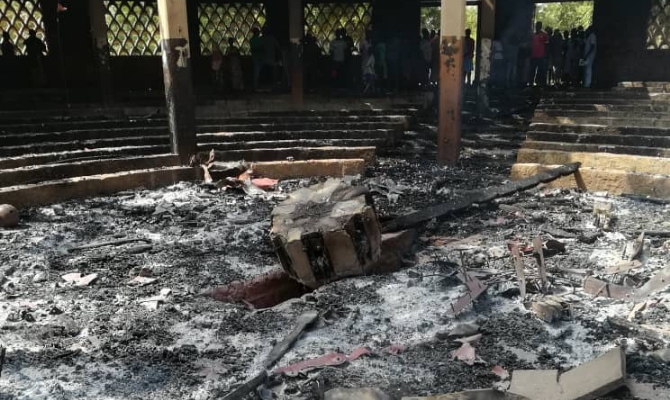Cameroon: Boko Haram raiders devastate villages
Towards the end of 2021 the Nigerian government announced that members of terrorist organisation Boko Haram were being disarmed and reintegrated into society. Through several operations, thousands of insurgents, including fighters, non-combatants and family members, were laying down their weapons in different parts of Borno state, in north-eastern Nigeria. Just last week, according to General Musa, a high-ranking Nigerian officer, 7,000 members of Boko Haram and its offshoot ISWAP surrendered.
However, according to information received by Aid to the Church in Need International (ACN), Boko Haram has shifted its sphere of operations to more rural areas of Nigeria and especially into the frontier regions of Cameroon and Lake Chad.
A report sent to ACN by the foundation’s project partners in Cameroon claims that since September 2021 Boko Haram has been inflicting regular attacks in Mutskar on the Nigerian border in northern Cameroon. These attacks have devasted Church life and slowed down all pastoral activities. “Today the people are full of fear and anxiety,” reports a local priest, who ACN has chosen not to name, for fear of reprisals.
In a more recent message to ACN the priest adds: “We have received another visit – one of many – from Boko Haram militants. They managed to reach Oupaï by coming through Douval. They killed two people, burned the houses and carried off clothing and small animals. Since mid-February four of the seven areas of the parish have been paralysed. We thought they wouldn’t be able to reach Oupaï because it is right on top of a mountain, but we were wrong!” Mount Oupaï is 1,494 metres high and lies close to border with Nigeria, in the far north of Cameroon.

“Five areas have been affected. The villages of Bigdé, Douval and Vara are already almost completely empty”, explains the priest, who adds that the terrorist cells have changed their modus operandi. “In the past they entered villages, ostentatiously yelling war cries,” he explains. “But recently they have come discretely, taking advantage of the full moon, to surprise people in their sleep. They kill the fathers of the family and the teenagers, especially the boys. Then they pillage the family’s property and destroy everything they can’t carry off.”
The Boko Haram raiders seem to be interested in cereals, goats and sheep, poultry and clothing, and they strip the people of everything they need to live. Existence was naturally precarious in a region where hunger is common and resources are scarce, but now the population has been forced into an exodus towards villages further north where they are exposed to other types of insecurity. “Those who stay are forced to sleep away from their pitiful shacks in the cold and in terrible conditions,” laments the priest, who has appealed for prayers and for safety. “The situation is really worrying, and we count on your prayers,” he concludes.
ACN has just approved a project to support a refugee camp for victims of Boko Haram in Minawao, in the diocese of Makolo, in the far north of Cameroon. Funds have also been allocated to print 2000 Bibles in Mafa, the language spoken in 12 parishes in the same diocese. The local Christians wish to improve their knowledge to be better grounded in their faith and thereby be better able to face the challenges posed by their increasingly radical Muslim surroundings.


